The 5th China Applied Economics Annual Conference (2024) took place from April 13 to April 14 at the Xiasha campus of ZUFE. The event was jointly organized by Renmin University of China and ZUFE, under the guidance of the Applied Economics Discipline Evaluation Group of the State Council's Academic Degrees Committee. The conference theme was "High-Quality Development and China's Economy". Participants engaged in lively discussions on various topics, including new productivity, the high-quality development of applied economics services, the construction and dissemination of independent knowledge systems in economics, and the cultivation of top innovative talents. These discussions aimed to contribute insights for advancing both China's high-quality economic development and the field of applied economics.
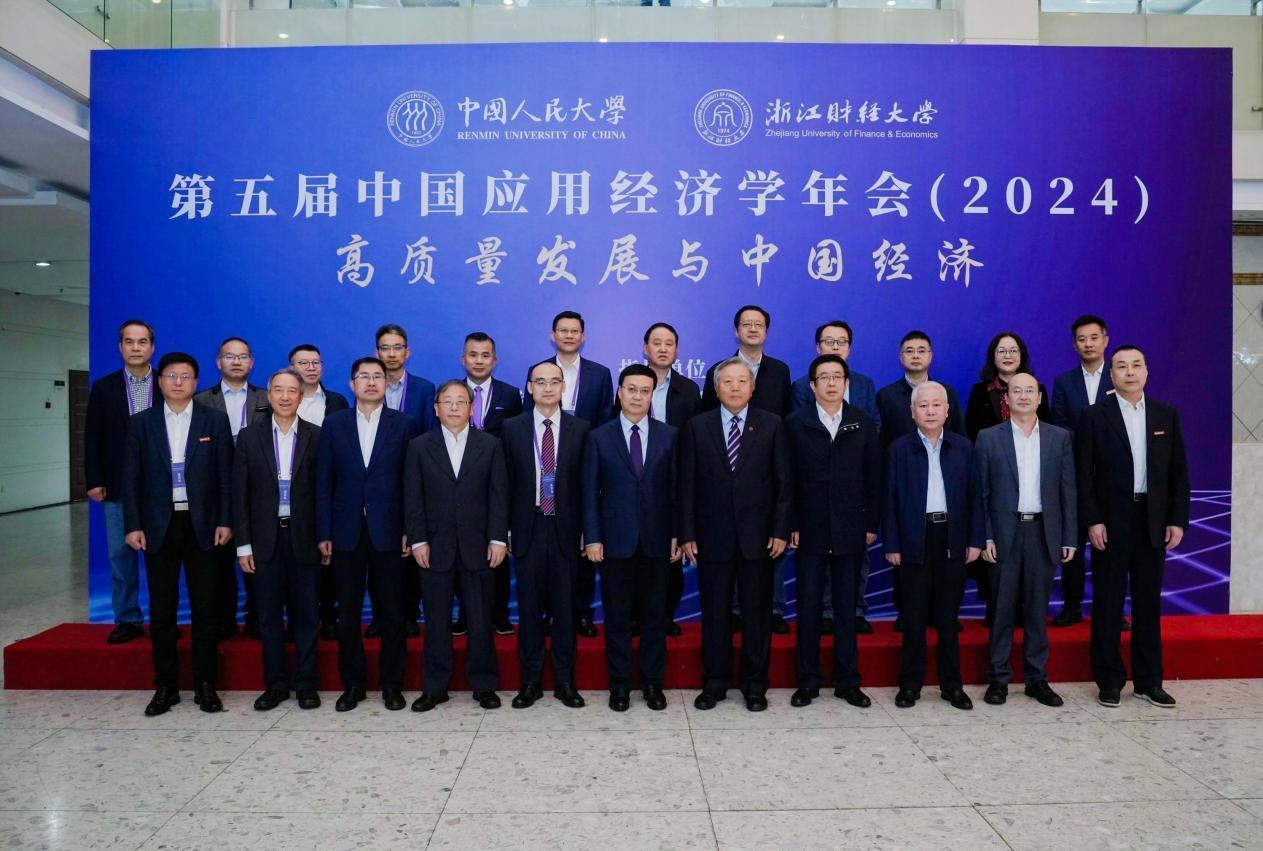
The conference was attended by several distinguished guests, including:
Wu Xiaoqiu, convener of the Applied Economics Discipline Evaluation Group of the State Council's Academic Degrees Committee, former Vice President of Renmin University of China, and national first-class professor;
Gao Peiyong, former Vice President of the Chinese Academy of Social Sciences, academician of the Chinese Academy of Social Sciences, and member of the Applied Economics Discipline Evaluation Group;
Lv Wei, convener of the Applied Economics Discipline Evaluation Group and former President of Dongbei University of Finance and Economics;
Ma Haitao, Secretary-General of the Applied Economics Discipline Evaluation Group and President of Central University of Finance and Economics;
Zheng Xinye, Vice President of Renmin University of China;
Li Jinchang, Communist Party Secretary of ZUFE;
Wei Jiang, Deputy Party Secretary and Vice President of ZUFE;
Zheng Yali, Vice President of ZUFE;
Wang Kuiquan, Vice President of ZUFE;
Cheng Shuang, Deputy Party Secretary of ZUFE.
Fourteen additional members of the Applied Economics Discipline Evaluation Group were also present. In total, over 300 participants attended the meeting, including representatives from universities involved in applied economics discipline construction, discipline heads, outstanding young and middle-aged scholars, and heads of prominent economics journal publishing houses.
Zheng Xinye, Lv Wei and Li Jinchang delivered speeches at the opening ceremony. Wei Jiang, Deputy Party Secretary and Vice President of ZUFE (leading executive work), presided over the event.
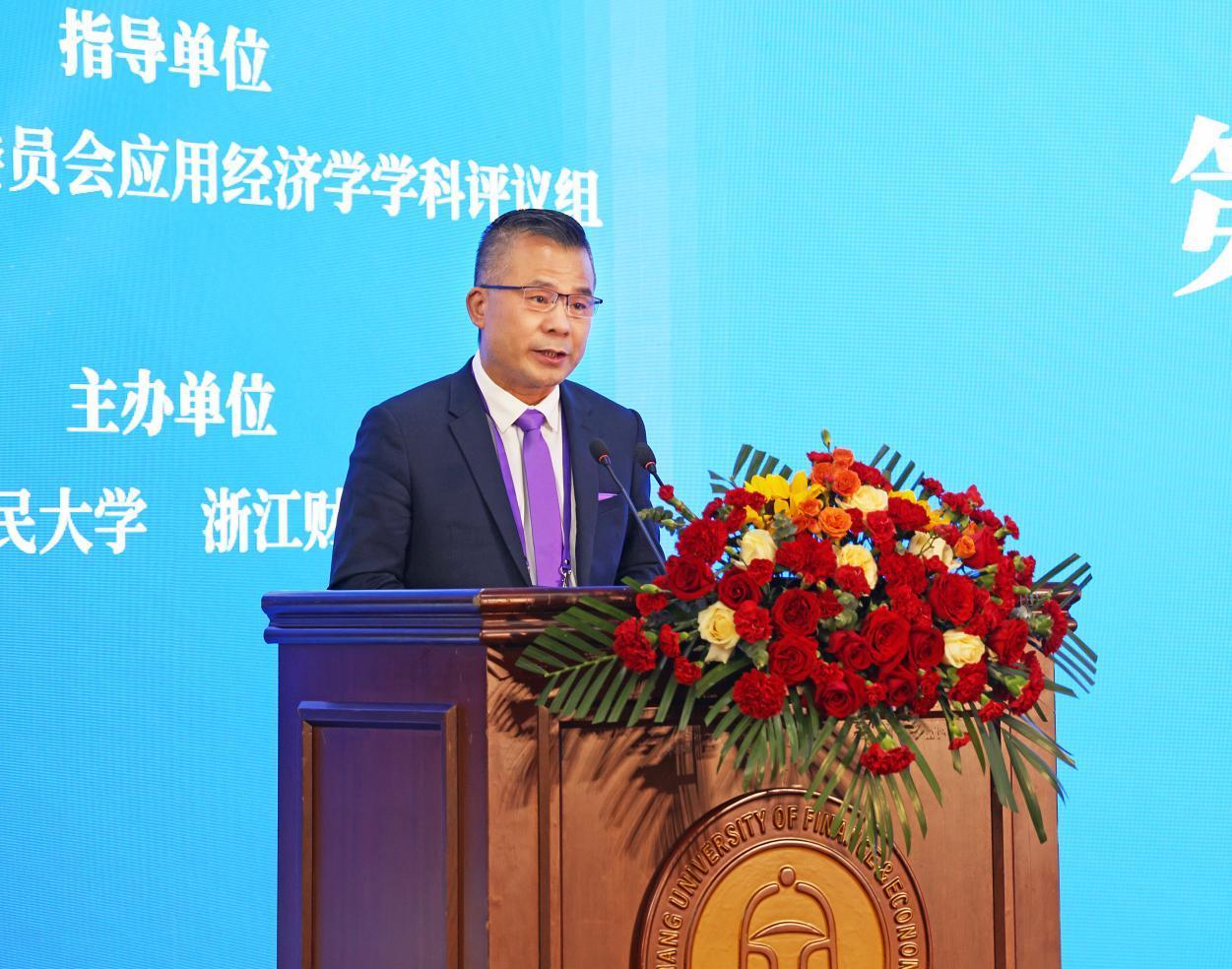
On behalf of Renmin University of China, Zheng Xinye extended warm congratulations to the conveners on holding this year's annual meeting. He highlighted that the conference, centered around "High-quality Development and China's Economy", offered an ideal platform for leaders in applied economics to share ideas, drive innovations through collaboration, and chart a common development path. This occasion, he noted, was particularly opportune to showcase China's economic strengths and promote a deeper understanding of its unique national conditions. Zheng Xinye expressed his hope that the academic community would engage in meaningful discussions and contribute valuable insights to better serve China's modernization process. He encouraged scholars to work diligently towards establishing an independent knowledge system for Chinese economics, which would drive the systematic development of new quality productive forces and advance research in the field.
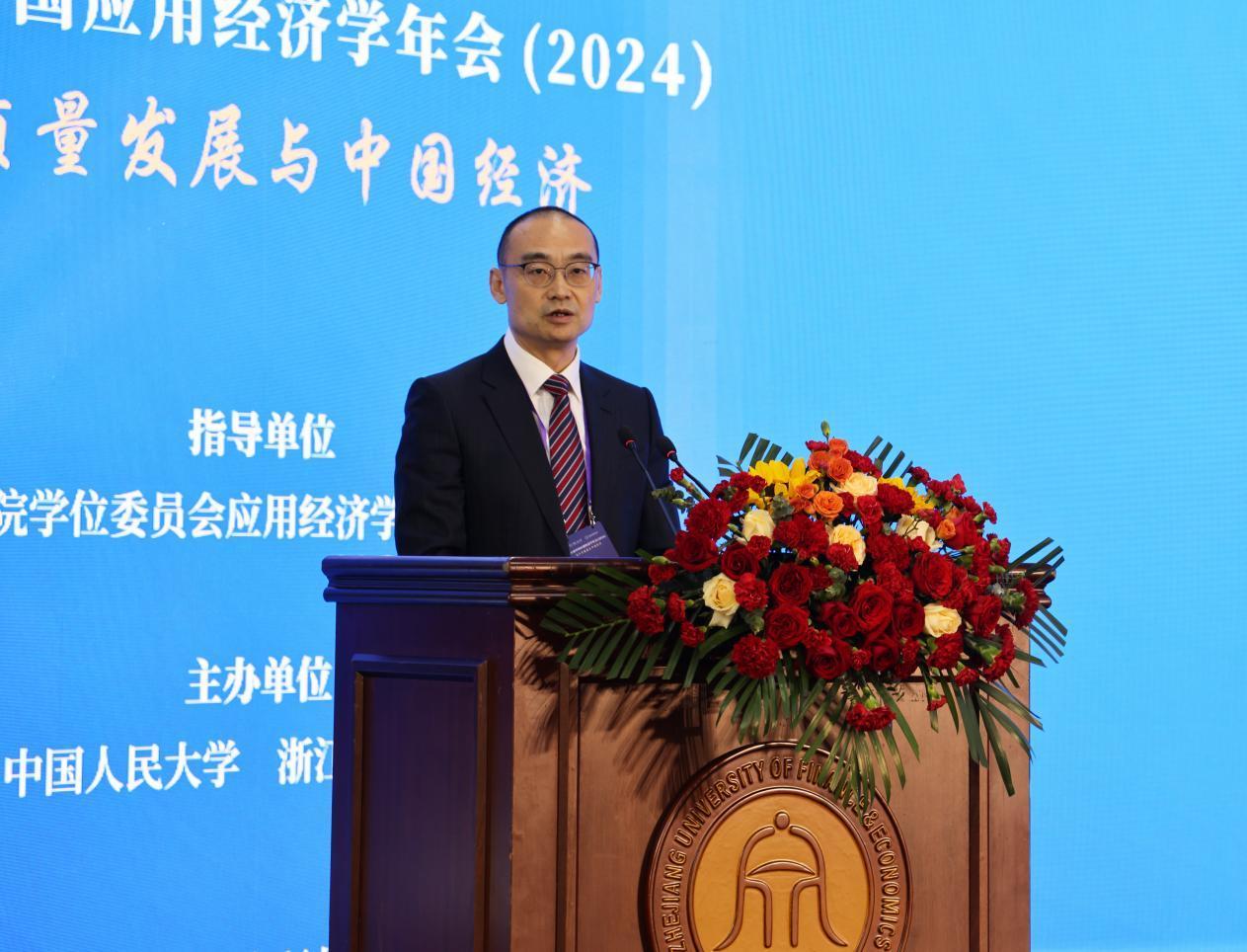
On behalf of the discipline evaluation group, Lv Wei extended warm congratulations to the conveners on holding this year's annual meeting. He also expressed heartfelt thanks to Renmin University of China and ZUFE for their efforts in organizing this event. Noting that the theme "High-Quality Development and the Chinese Economy" resonates strongly with Applied Economics, he emphasized its timeliness and relevance. Lv Wei identified three key areas where Applied Economics can excel: staying attuned to new issues, distilling best practices, and driving progress in high-quality development. He expressed confidence that this field is entering a promising new era, poised to make significant contributions to the pursuit of high-quality development.
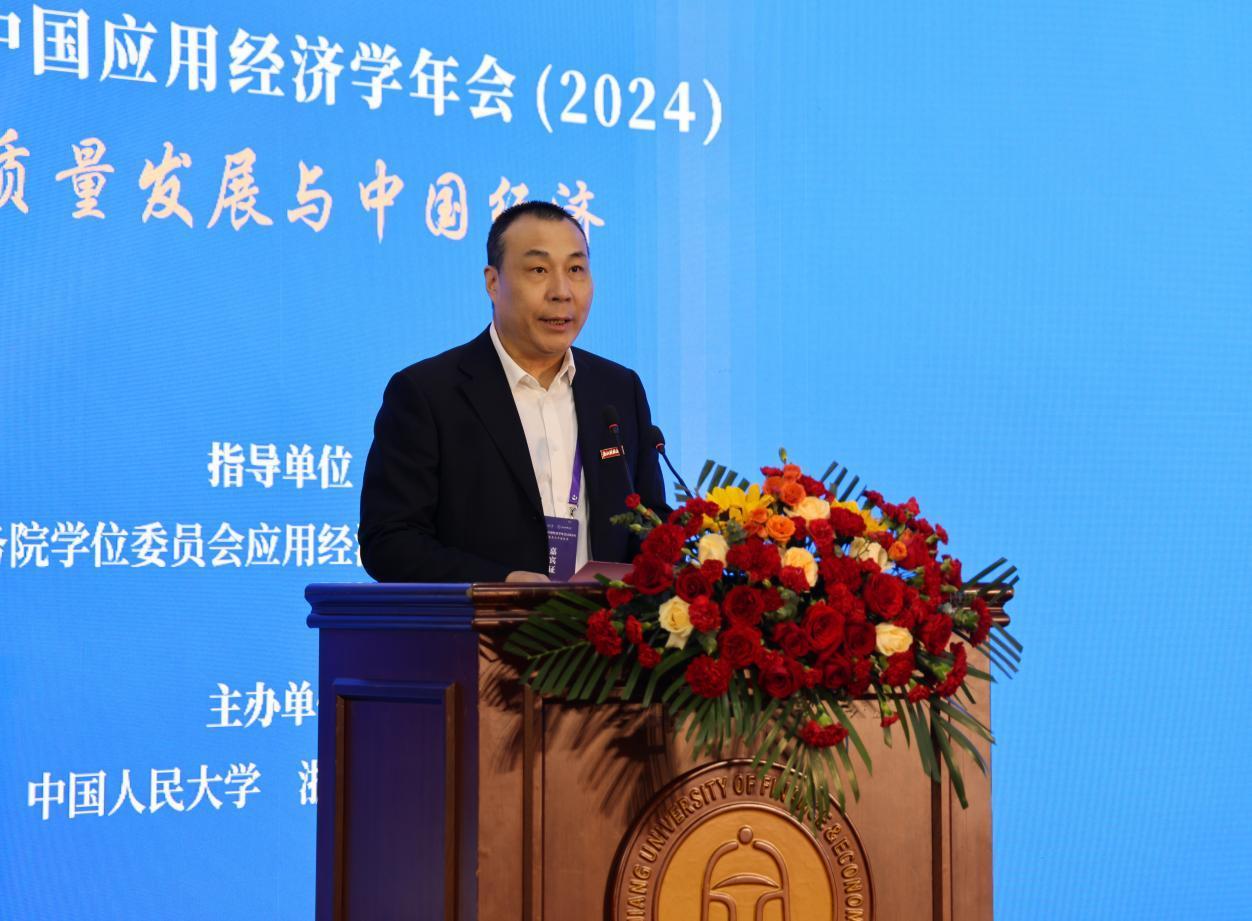
On behalf of ZUFE, Li Jinchang warmly welcomed the participating leaders and experts. He highlighted that ZUFE is comprehensively advancing the "New Finance and Economics Strategy" Action Plan, driven by a new discipline system, underpinned by a new student talent cultivation system, supported by a dynamic education ecosystem, and safeguarded by a robust governance system. As host of this conference, Li Jinchang emphasized that ZUFE will leverage this opportunity to further deepen exchanges and cooperation with domestic and foreign universities and scientific research institutions. The university aims to upgrade the quality of discipline construction, and in doing so, contribute significantly to the development of China's Applied Economics.
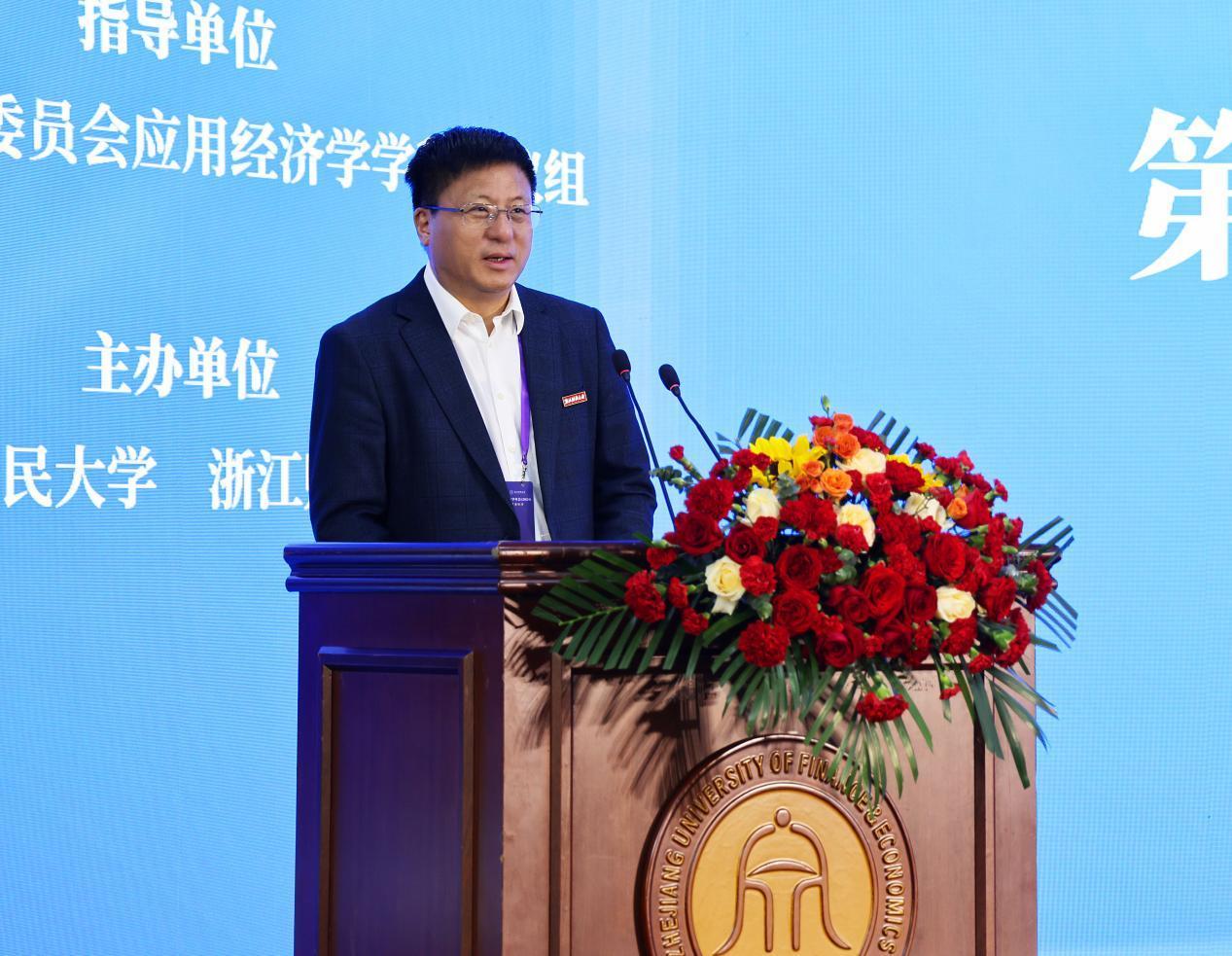
As moderator, Wei Jiang emphasized that this annual conference would focus on addressing major practical issues and innovative concepts in the field of economics. He underscored the conference's vital mission: to contribute to the development of China's independent economic knowledge system and advance the country's economic disciplines. Wei stressed the event's significance both theoretically and practically, highlighting its potential to consolidate the collective wisdom of economics experts, integrate diverse research findings, and facilitate the exchange of research methodologies and ideas among scholars. He expressed his conviction that these outcomes would greatly benefit the field of economics and its application to China's development.
Following the opening ceremony, Gao Peiyong and Wu Xiaoqiu delivered keynote speeches. The session was presided over by Zhong Xiaomin, a distinguished member of the Applied Economics Discipline Evaluation Group of the Academic Degrees Committee of the State Council and former President of ZUFE.
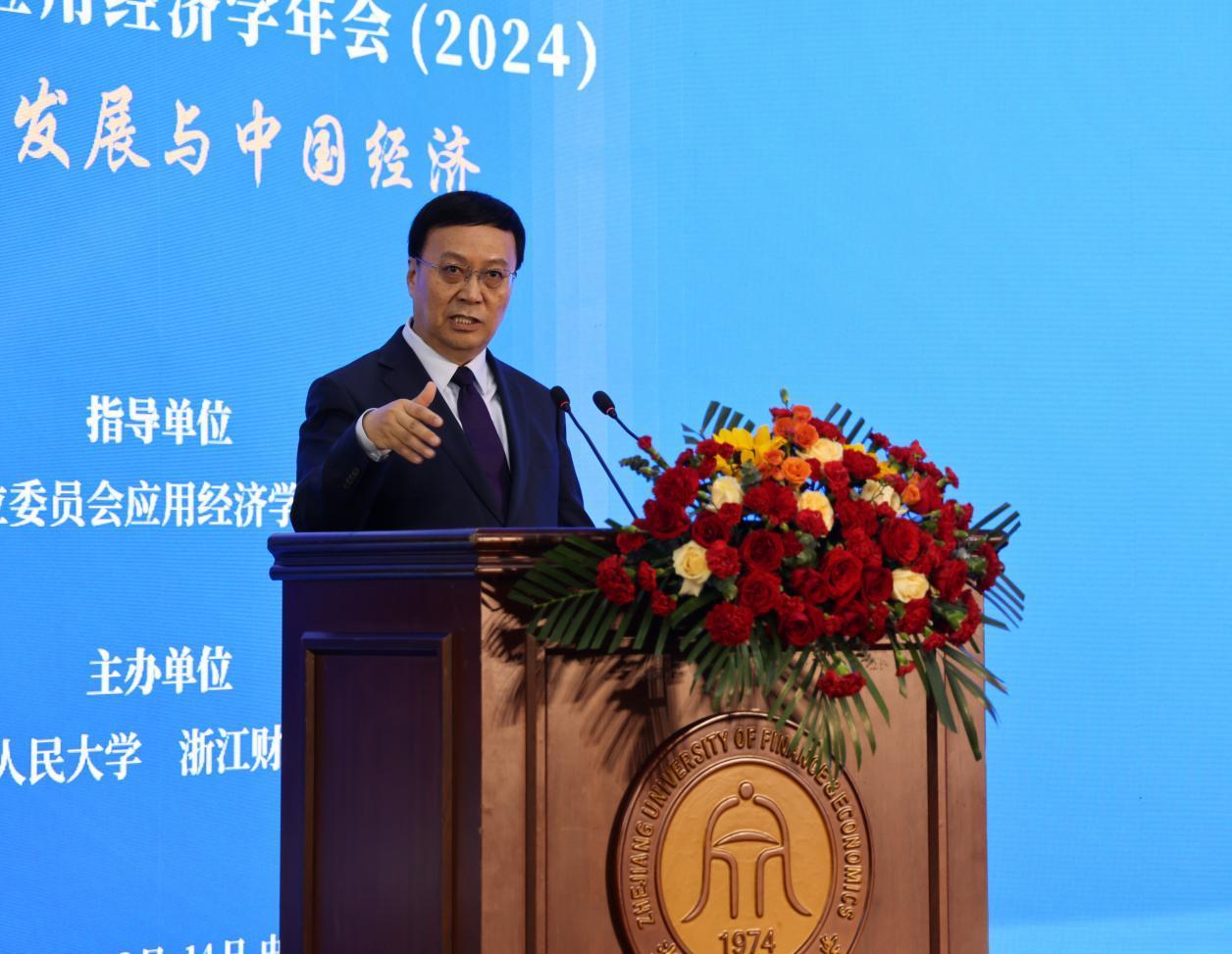
In his keynote speech, "Attention to Profound Changes in Macroeconomic Governance", Gao Peiyong highlighted the need for profound reforms in key areas, including the fiscal system and taxation. He urged the economics community and economic analysts to challenge their existing assumptions and re-examine macroeconomic governance strategies, breaking free from inertial thinking. Gao emphasized that theoretical research must be grounded in practice, and that expectation management plays a critical role in macroeconomic governance, requiring continuous refinement and improvement.
He also stressed the importance of institutional and mechanism reforms in reconstructing the macroeconomic governance system. Gao's keynote speech served as a call to action for the economics community to reassess their approach to macroeconomic governance and work towards creating a more effective and responsive system.
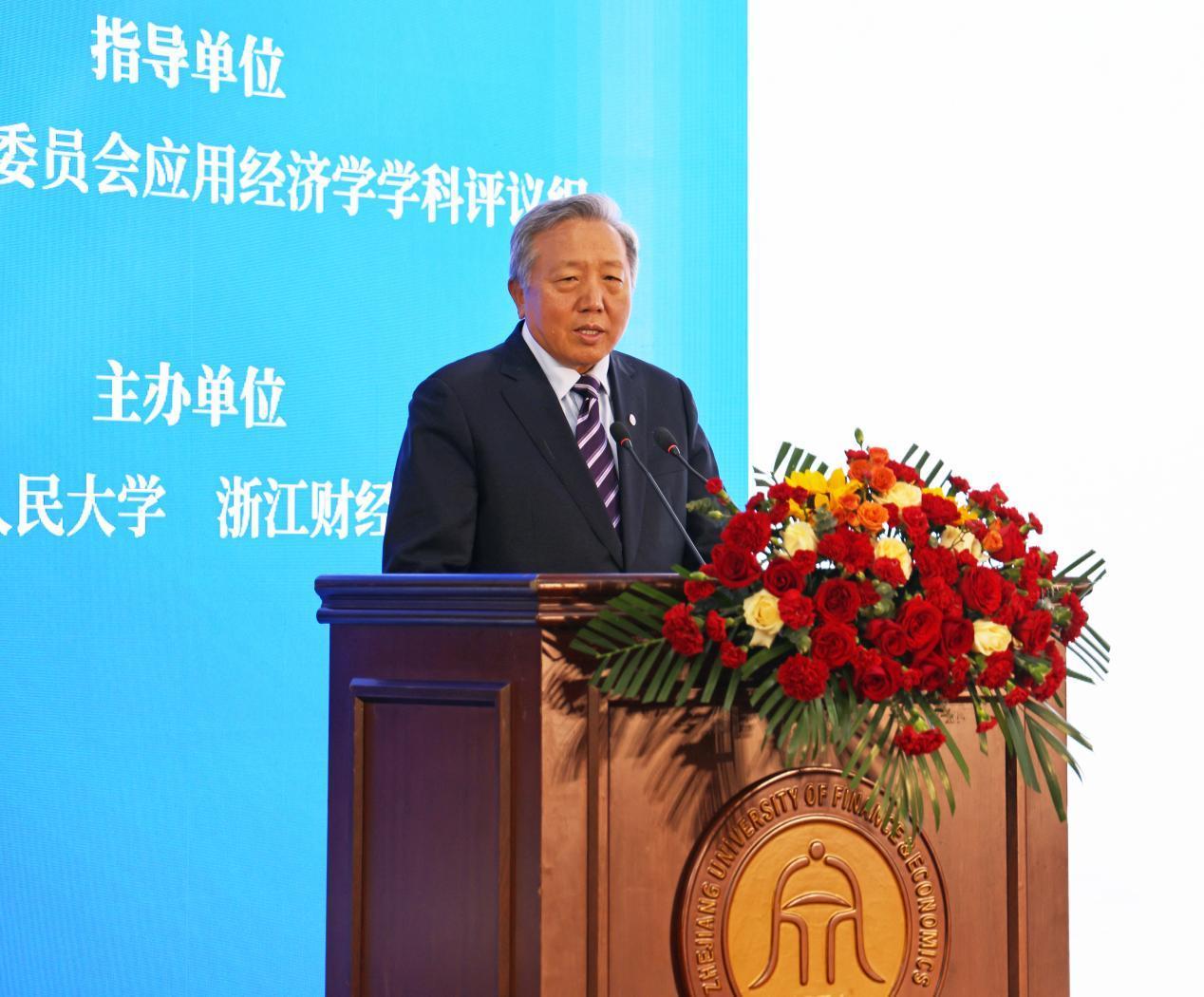
In his keynote speech on "Research on Valuation Differences in Global Capital Markets and China's Element Valuation System", Wu Xiaoqiu delved into the theoretical and practical issues surrounding capital market valuation, focusing particularly on the underlying reasons for China's lower capital market valuation compared to developed countries. He highlighted that the valuation of China's capital market is influenced by various factors, including its economic system, innovation capabilities, market openness, and legal culture.
Wu Xiaoqiu also emphasized that the lower valuation of central enterprises is closely linked to their lack of mergers and acquisitions (M&A) functions and liquidity premium. He called for strengthening the law-based and market-oriented construction of China's capital markets, and maintaining confidence in the capital market. Wu argued that the capital market can become a vital conduit for transforming our country into a financial powerhouse.
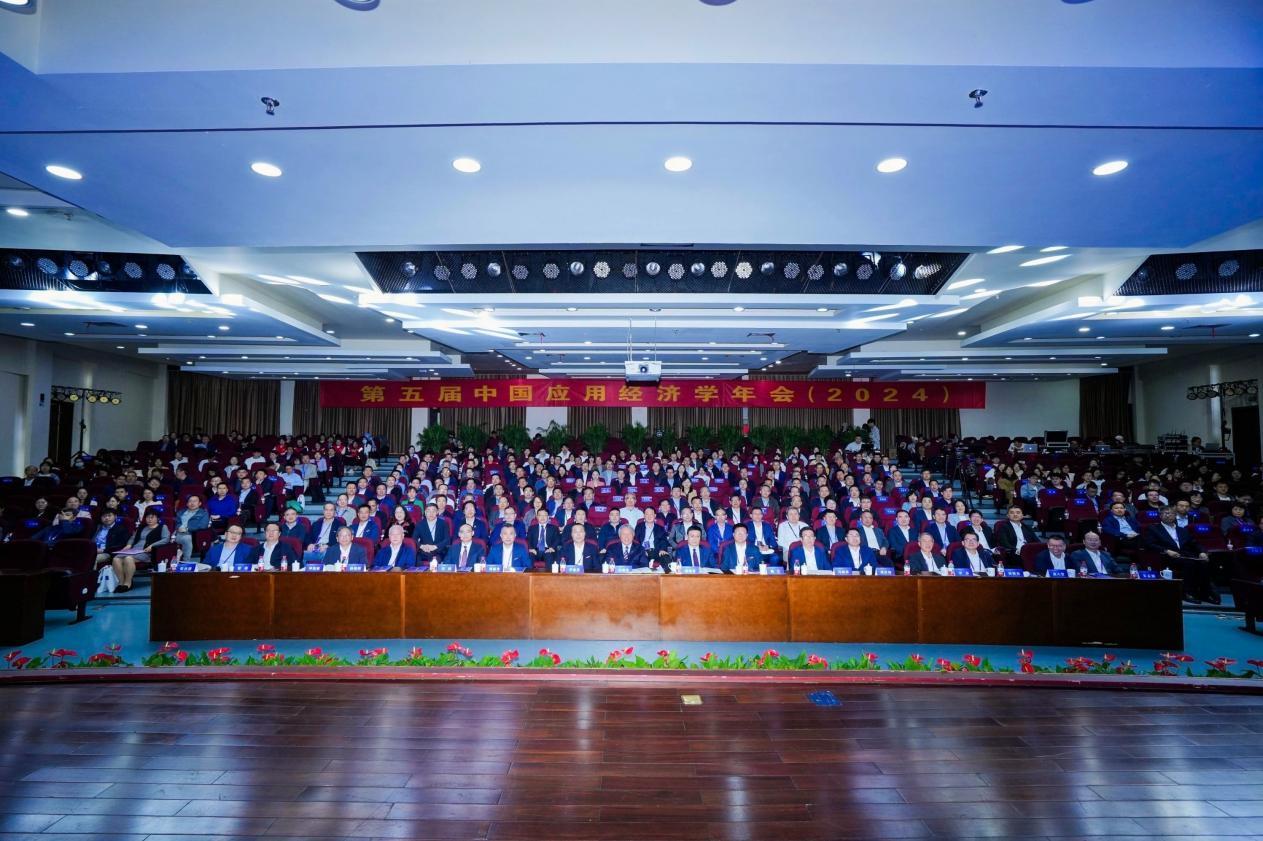
The annual meeting also featured 10 theme forums, including the Prologue Forum, Qiantang Night Talk, Presidents Forum, and Conference Forum. These forums provided a platform for experts and scholars to engage in lively and focused discussions on a range of topics, including:
New quality productive forces and high-quality development;
The present and future of Chinese Economics;
Building an independent knowledge system for Chinese Economics;
Macro-regulation with Chinese characteristics;
A new round of economic system reform;
Accelerating the development of new quality productive forces;
Building a modern industrial system;
Accelerating the construction of a unified national market;
Accelerating the development of the digital economy;
Accelerating the construction of a high-level opening up;
Integrated development of education, technology and talents;
Digital intelligence transformation and high-quality development of journals.
These forums allowed participants to delve into these complex topics and share their insights, expertise, and perspectives, fostering a rich exchange of ideas and knowledge.

On April 13, the Prologue Forum was held in the afternoon, focusing on the theme "New quality productive forces and High-quality development". The forum featured presentations by renowned scholars from leading institutions, including Feng Genfu, Zhu Mengnan, and Li Yongyou, members of the Applied Economics Discipline Evaluation Group of the Academic Degrees Committee of the State Council.
Additional reports were delivered by experts from Yunnan University of Finance and Economics, Guizhou University of Finance and Economics, Chinese Academy of Social Sciences, and Shandong University. Specifically, Wang Min, Zhao Pu, Gao Wenshen, and Lin Pingping shared their insights with the audience.
Tan Songtao, Deputy Secretary-General of the Applied Economics Evaluation Group of the Academic Degrees Committee of the State Council, and a professor at the School of Finance at Renmin University of China, presided over the forum.
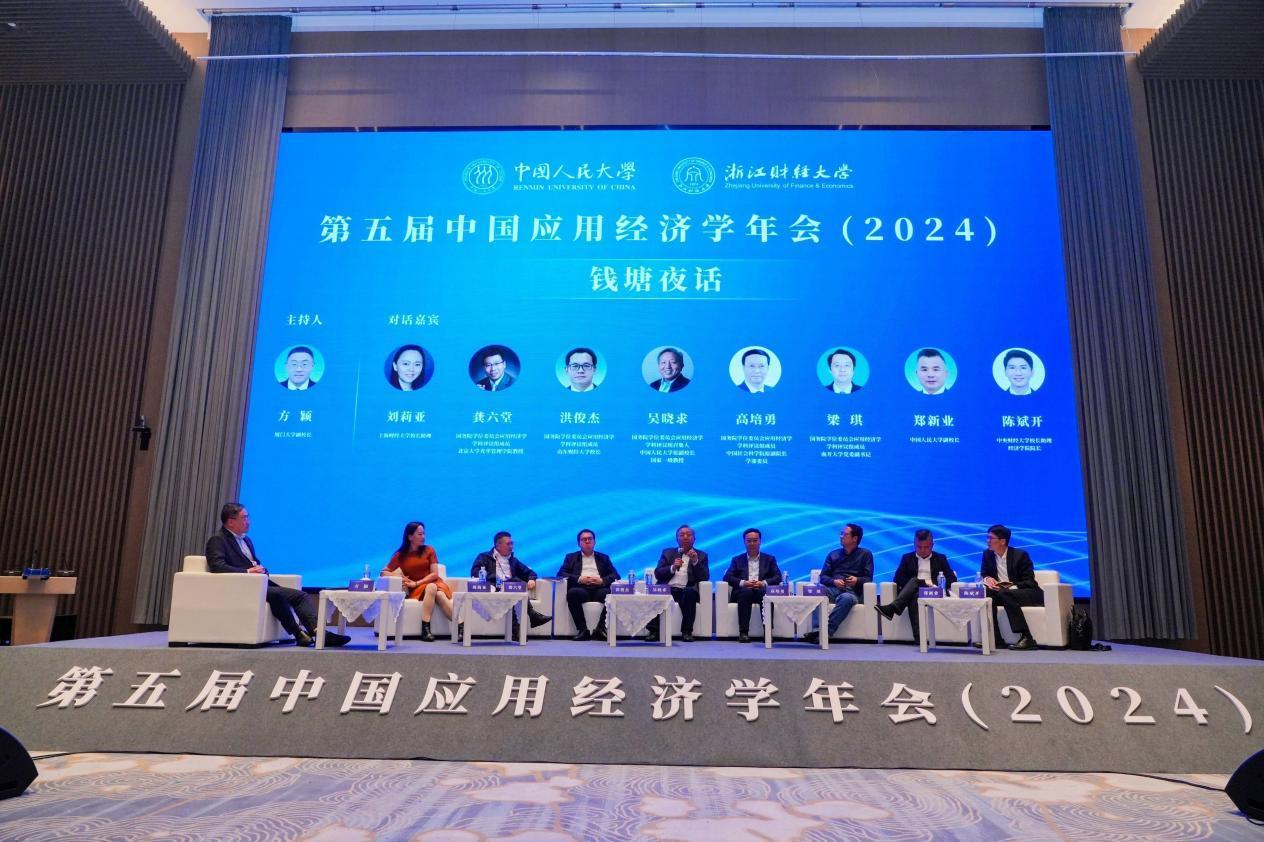
On April 13, evening, the Qiantang Night Talk was held, focusing on the theme "Today and the Future of Chinese Economics". The discussion featured a round-table dialogue between esteemed scholars from leading institutions, including Wu Xiaoqiu, Gao Peiyong, Hong Junjie, Liang Qi, and Gong Liutang, members of the Applied Economics Discipline Evaluation Group of the Academic Degrees Committee of the State Council.
Additionally, well-known experts such as Zheng Xinye, Liu Liya, and Chen Binkai from Renmin University of China, Shanghai University of Finance and Economics, and Central University of Finance and Economics joined the discussion. Fang Ying, Vice President of Xiamen University, presided over the Qiantang Night Talk.
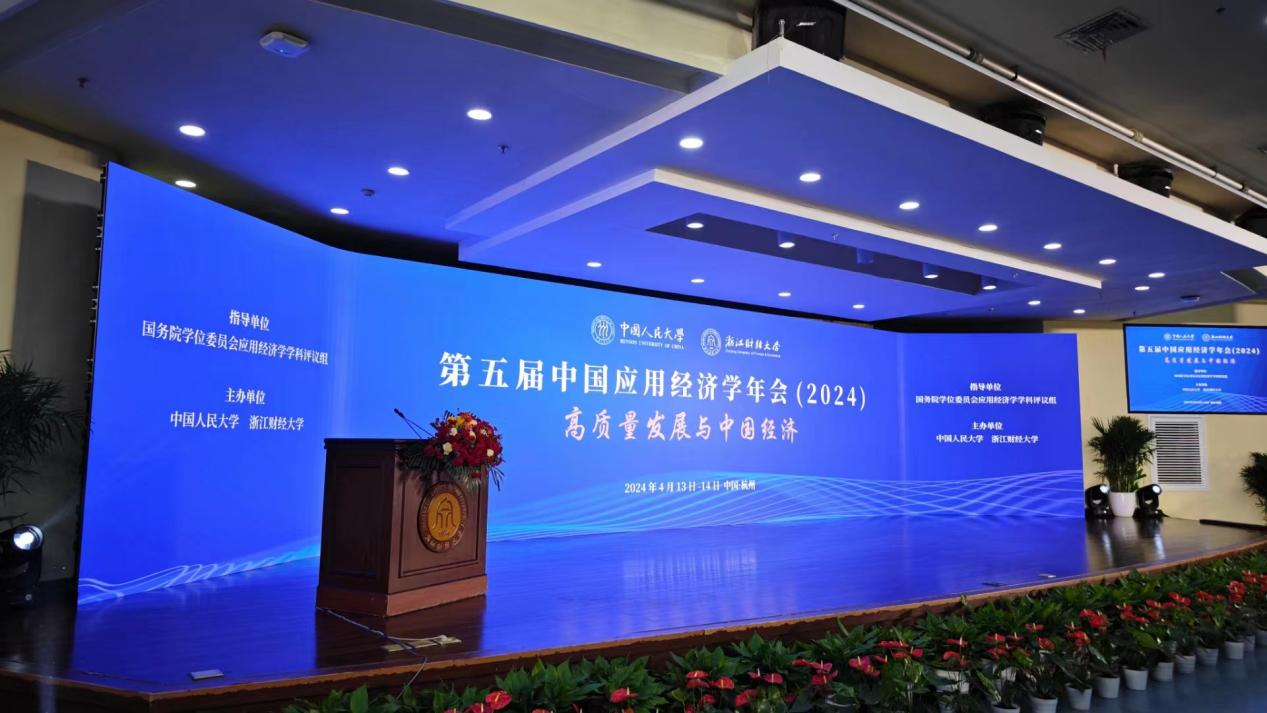
The China Applied Economics Annual Conference was initiated by Renmin University of China under the guidance of the Applied Economics Discipline Evaluation Group of the Academic Degrees Committee of the State Council. The conference aimed to establish a platform for high-level development and exchange in Applied Economics, contributing to the construction of an independent knowledge system in Economics.
The event was designed to align with the spirit of the Central Economic Work Conference and the Two Sessions, with the theme "High-Quality Development and China's Economy". The focus areas included:
New quality productive forces and high-quality development;
Applied Economics disciplines that serve high-quality development;
System construction and dissemination of Applied Economics independent knowledge;
Exchanges on topics such as cultivating top innovative talents in Economics.
The conference was hosted by the School of Finance and Taxation, School of Economics, School of Finance, School of Supervision, Office of Discipline Development, Office of Periodicals, and other relevant schools at Renmin University of China.
